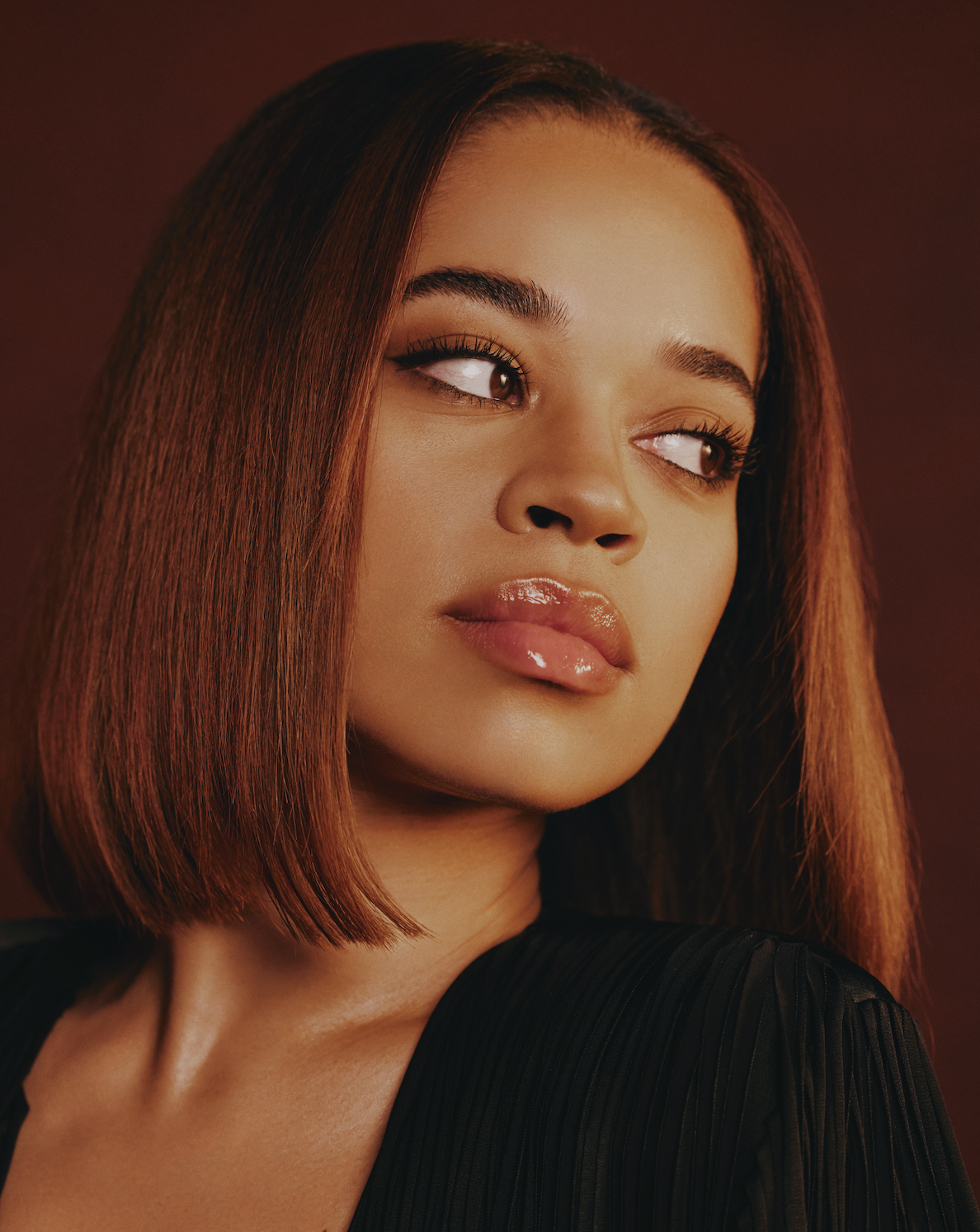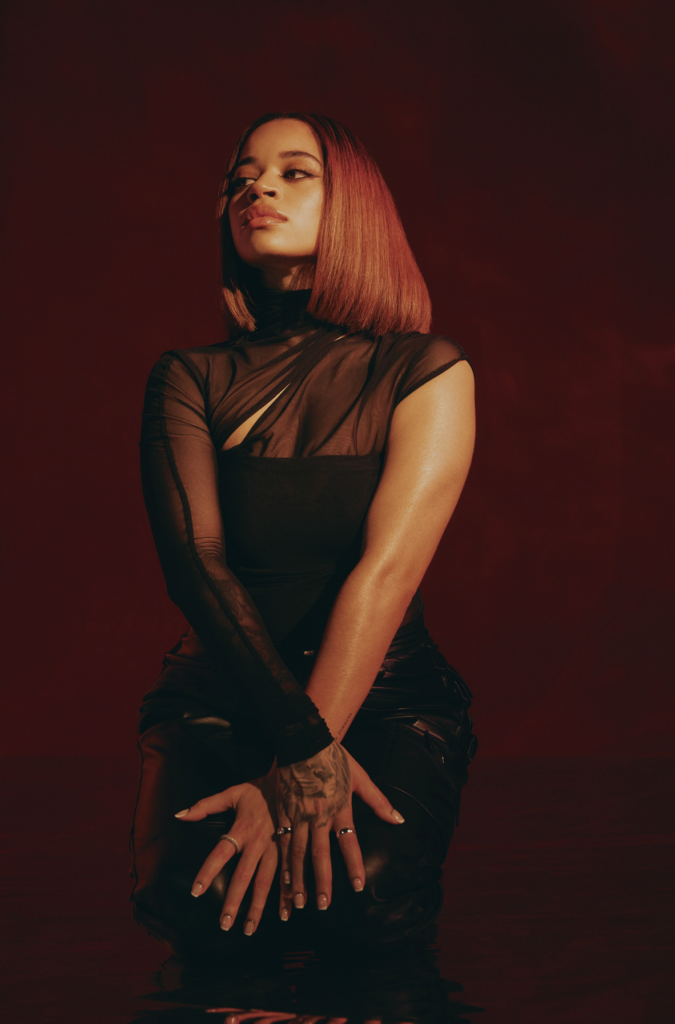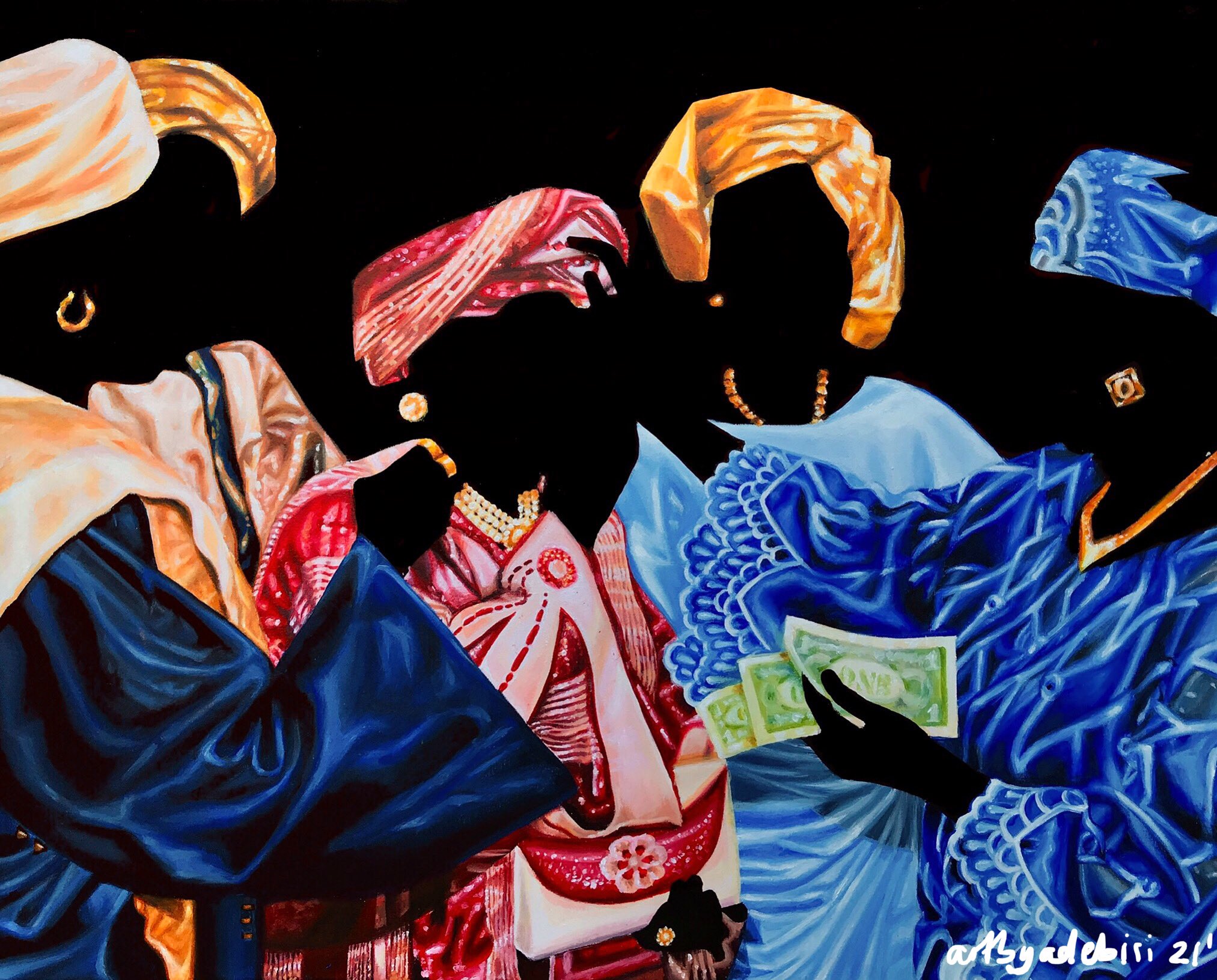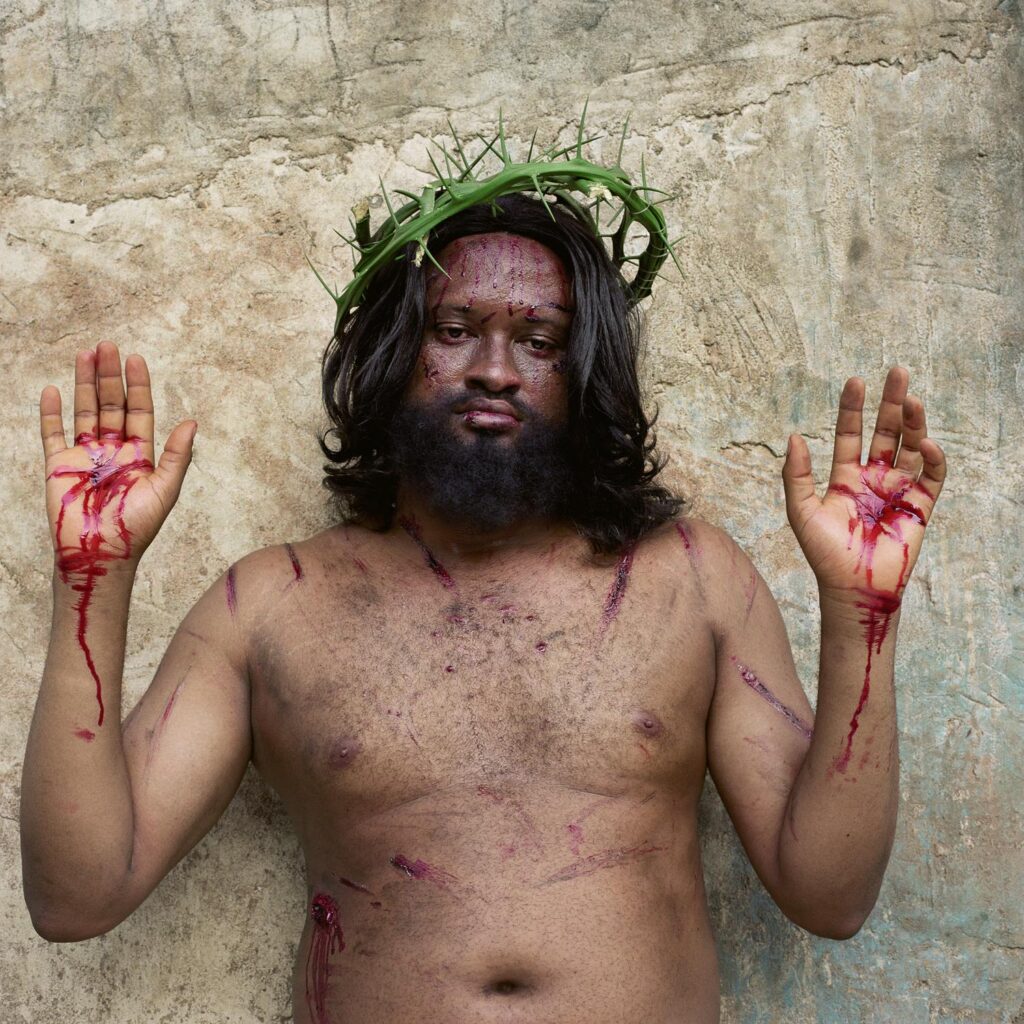Ella Mai on R&B’s UK and US Cross-Frontier and Accepting the Discomfort in Growth

Ella Mai on R&B’s cross-frontier between the US and UK, accepting the discomfort in growth and the value of vulnerability.

Ella’s roots were nurtured in England, gathering the necessary know-how in music from her years at the BIMM. In 2015 she dipped her toes in the water with a SoundCloud release titled Troubled and she was quick to discover the waters were temperate and welcoming.
The 27-year-old can now be found residing State-side; a place that received her compellingly organic-approach to music with open arms. This doesn’t mean to say Ella had not truly earned her reputation in the UK, her foundations were sturdy to say the least and her legacy, nothing but impressive. In the two years spanning 2016 to 2018, Ella released three EPs via DJ Mustard’s label, followed by her debut album in 2018 which featured grammy award winner “Boo’d Up”.
There’s also very few people that can say they have an earnest seal of approval from a UK great like Chip. “Chip was actually one of the first UK artists to really embrace me. This was way before “Boo’d Up”, this was my EP days.” she tells me, “We happened to both be in LA at the same time and he reached out to me and bluntly said: ‘I love what you do, I think you’re cold. I’m going to be in LA if you’re gonna be there–pull up to the studio’. And I did.”
And what better sonic blueprint for a career dedicated to music than the pivotal Miseducation of Lauryn Hill? A body of work so profound to its core that the album carried L Boogie through two decades and counting with barely a whisper. A record, she tells me, would be put on repeat in her mum’s car (albeit being the only tape she had in there, but there was good reason for it).
Each step forward in her career eventually led to a rightfully earned title as Top R&B Artist at 2019’s Billboard Music Awards. An award which should not be taken lightly–following in the footsteps of luminaries like Mary J Blige–someone she still sees herself a fan of, “I remember meeting Mary J Blige and she told me, ‘I’m such a fan’. And I’m just thinking that doesn’t even make any sense. In my mind, I’m the fan, but you’re telling me that you’re a fan of mine”.
Although her sound elegantly pays homage to those early days of r&b, with singles like her most recent “Leave You Alone” and features across a variety of artist’s tracks like JID’s “Tiiied”, she proves over and over that her provoking vocals can adapt to any style she sets her mind to.
Check out the full conversation below.
GUAP: You’ve once again shown versatility in your style with your latest single, which can be tough when you made such a big impact early on in your career. Did this come naturally or is there anything that you found that helped you to diversify your sound?
ELLA: It’ always about what I could work with and what I was feeling at the time, so I guess it wasn’t a conscious effort. But I definitely do like to explore, challenge myself and not always make things that sound exactly the same. So it’s 50/50.
There seemed to be evidence of you focusing on growth as well? You sang in DFMU “Gotta learn how to let someone in to hold. It takes time, gotta trust who I let control”, do you feel like you have been able to grow into this idea of letting someone in?
I do. You know what? I might be giving myself too much credit here… But I feel like I give people the benefit of the doubt a lot. Sometimes, in certain situations, I give people too much of that. I do think I’m quite open to letting somebody in, it just depends if I feel like that’s the right person or not. At the end of the day, obviously, as humans, no matter how much anyone goes through heartbreak, or goes through failed experiences and relationships, you still look for love or somebody at least; so I think I definitely am open to letting someone in. I’ve always been open to it, it just depends on what the situation is.
Is it hard for you to be so open with the public with the people you share your music with?
Yeah. It’s definitely difficult. It depends. I always say with my debut album, a lot of the stuff that I was writing was what I experienced; but it wasn’t super, super in-depth. And I definitely feel like with “DFMU” and with the new album, I’ve definitely dived in a little bit deeper, and it’s certainly more vulnerable regarding my life in real-time. So it’s absolutely scary. But I do think about the music that I grew up listening to or the artists that I hold to a high standard, and they’ve always been super vulnerable, and always been very black and white with what was going on, through their music. And that’s the stuff that people relate to. That’s the stuff that people really feel, you know, you can if you’re thinking about something that has happened to you and you really feel what you’re singing you’ll automatically feel it more in the delivery than if it were just made up. So it’s definitely difficult, but I think it makes for the best music.
with my debut album, a lot of the stuff that I was writing was what I experienced; but it wasn’t super, super in-depth
Do you find the writing process different for your recent music?
It hasn’t been super different, as in: we haven’t gone into the studio. And it’s been something I haven’t done entirely. I’ve had a few sessions where we’ve tried out new things. And some things worked and some didn’t. But typically, it’s similar. I think the difference is that it’s just far more sure of myself as an artist, what I want to say and what I want to sound like. So that makes the process slightly different obviously, because I’m a lot more involved. Although I was very involved with my debut album as well, just trying to not doubt myself. The studio was very new to me when I was writing my debut album so, in some situations, I wasn’t as vocal as I should have been about something that I wanted to say, for example. Whereas in this process on my sophomore album, I was very sure of what I wanted it to sound like, what I wanted it to say and we then just had to figure out how to say it. So yes, I think definitely just maturing and doing different things in my life as a woman and then kind of putting my artist life and being able to explain is the change that’s occurred.
Do you let things come out organically? Are there any studio mistakes or subconscious additions that you have left in the album?
For the most part, it’s pretty organic, definitely when working with somebody who I’ve worked with before. I definitely have my go-to’s, obviously, Mustard and my go-to songwriters, so that’s a lot more of a comfortable situation and therefore a more organic situation. If it’s somebody I haven’t worked with before, it’s still supernatural.. We’ll sit down and I’ll play stuff that I’ve been working on, they’ll play stuff that they’ve been working on and we’ll try and find the middle ground and figure out what we want to talk about. And like I said before, I never go into a session with the mindset – this is what we have to make, this what has to sound like. I prefer to come up with whatever feels great for all of us in the room at the time. For the producer, the songwriters… Because at the end of the day, it’s a collaborative effort. I don’t like a lot of people in the studio, I know some people like to work in an environment that’s like a party. I can’t concentrate like that. So whoever really needs to be there, other than that, it’s pretty quiet. I’ll be there with my fruit and my yoghurt and I’ll be super, super focused.
Not getting drunk or anything like that.
I know a lot of people obviously create under the influence because they feel like it opens a different part of their brain. But I can’t concentrate like that. So I definitely have to be sober and focused.
I suppose a lot of people probably don’t even know that their focus becomes different. You’ve talked about confidence in your career as well. In 2020 you had co-signs from both Beyonce and Rihanna, did that give you a renewed sense of confidence?
Oh, 100%, it’s really weird. And I always say to people, when you meet people who you’ve grown up admiring, you’re just in awe of them as people and musicians, and then suddenly you meet them. People say don’t meet your idols. But I’ve been lucky enough that everybody I’ve met has been so kind and gracious to me, always really supporting and uplifted me. I think naturally that would make you more confident, even as a person. Like when I met Beyonce and she was saying she ‘loves my stuff and congratulations, keep going’. It was an amazing feeling. And to me, it’s still quite weird… I remember meeting Mary J Blige and she was like, ‘I’m such a fan’. And I’m just thinking that doesn’t even make any sense. In my mind, I’m the fan, but you’re telling me that you’re a fan of mine; so it definitely helps. I’m just really grateful that I’ve had such great experiences with people that I love–that now also love me. It’s an amazing feeling.
People say don’t meet your idols. But I’ve been lucky enough that everybody I’ve met has been so kind and gracious to me, always really supporting and uplifted me.
I know imposter syndrome may feel real, but it’s all well deserved for sure. Talking about collaborations, you worked with Chip early on in your come up, in 2017…
I think that was 2017 if I’m not mistaken! Chip was actually one of the first UK artists to really embrace me. This was way before “Boo’d Up”, this was my EP days. We happened to both be in LA at the same time and he just reached out to me and was just very blunt and was saying to me: ‘I love what you do, I think you’re cold. I’m going to be in LA if you’re gonna be there–pull up to the studio’. And I did. I went with my brother and it was at Harmony Samuels studio who was a UK producer, but is also based in the states now. Then there’s Baron Wade. I work with him all the time now. He’s an English writer as well, but based in the states too. So it was literally like a UK linkup but make it the American edition. So that was the first time me and Chip have met. And it was just vibes. Everybody was just really open to seeing what we could come up with. And “HMU”, which is the song that came out, was actually the second one we did. We made a different song before because we worked on a fair bit. He was always very open with the fact he was a fan of what I did so he just wanted to see what I could bring. Since I was young there wasn’t a single person who wasn’t a Chipmunk fan from the UK. So I was really honoured that he was a fan of mine; especially considering he was kind of like the first person to embrace me as an artist before I was even, quote-unquote, ‘super successful’.
Would you say there’s any musical influences that have been inspired by your family?
There was a bunch of different stuff in my house because my grandma is a minister in a Pentecostal church, so there’s a lot of gospel music. But my mom has always been a super a soul/ neo-soul/ r&b fan, so I remember I grew up with a lot of that; The Miseducation of Lauryn Hill was on Repeat daily for example, my mum even had the tape in the car–it’s all she would listen to. So it was a lot of Lauryn Hill, Angie stone, Jill Scott, Mary J. Blige, Sade Missy Elliott, which as a child, I probably shouldn’t have been listening to it, but I didn’t understand it at the time. Now however, I love Missy Elliott and as I’ve gotten older, I understand her music a lot more. I think she’s one of those artists that doesn’t get spoken about enough.
There’s this current conversation surrounding r&b and saying it will never truly be the same. What’s your personal take on that discussion?
At the end of the day I think the question is, is it supposed to be the same I feel like you know as people and as culture shifts and moves on, everything evolves. And in every genre, for example rap isn’t the same as it was in the 90s. Country music isn’t the same as it was, or folk music, or disco music which isn’t as popular as it was in the 70s. I think it’s definitely a conversation that happens a lot recently because of the era that most r&b fans grew up on, like the 90s or 2000s. But I’m not mad at the r&b that gets made today. I think we still have amazing r&b music, and it’s no, it’s not the same but I don’t necessarily think that that means that it’s wrong. The world has changed a lot since then.
And what is your take on the r&b scene in the UK as well?
The r&b scene in the UK, I think, is in a much better place right now than it has been in a very long time. But I also maybe that there’s progress to be made. I definitely feel like there’s a lot more work still to be done and I feel like it’s our job as artists, especially as UK artists, to kind of keep pushing those doors open and breaking the barriers down. So I know it can be disheartening sometimes if people feel like they’re not getting the recognition they deserve. Everything is no, no, no. But I definitely do feel that there’s way more than enough artists that make amazing r&b music in the UK. They continuously do that, and an artist like myself who has had success abroad I’m still very in tune with what’s going on in the UK. As long as we continue to collaborate and just kind of make sure we continuously keep our foot on everybody’s necks to make sure that everybody gets the recognition that they deserve. And it will be in a way better place than it is right now. But it’s definitely a difficult genre, I understand that.
I know it can be disheartening sometimes if people feel like they’re not getting the recognition they deserve. Everything is no, no, no. But I definitely do feel that there’s way more than enough artists that make amazing r&b music in the UK
There’s some need for support for the r&b genre in the UK perhaps…
I think it’s weird, but it’s definitely something that everybody loves. It’s not even like people don’t like r&b in England, that’s not the case. R&b has been a thing in England from way back before we were even born. And I feel like back in the day a lot of American people came to England to work on r&b. So it’s definitely there. And it always has been. It’s more so about changing the narrative that it doesn’t work. I think that’s the narrative that this generation is starting to change. I think it’s an old mentality really. And like I said, the more we do it, and the more we listen, I think it will change.
Y2k has been very fashionable in recent years. So maybe that’s influenced the conversation in some way.
Definitely.
How has it been for you, being able to share your music with your audience again live?
Oh, it’s so exciting. I actually haven’t even done that many live shows as of yet, obviously, because I’m just now releasing music. But I had done a few on late last year. It just makes all the difference in performing. Performing when everything was virtual was still fun, because you still got to perform and you still got to sing. But there’s just the added level of excitement and the feeling that you get from having people in the audience either sing back to you, or even if they’re just listening, just to have those experiences is so important. It really adds everything you need, it’s energy that you need. Sometimes you need more of that energy to make sure you perform better. So it’s something that I think as artists, we took for granted a little bit. I know being on tour is super tiring–so there’s times when I was touring, when all I wanted was a day off. But recently, I can’t wait to get on stage. Touring is one of my favourite parts of all of this, so I definitely can’t wait to get back on stage and see all of my friends around the world.
…there’s just the added level of excitement and the feeling that you get from having people in the audience either sing back to you, or even if they’re just listening, just to have those experiences is so important.
What would you say the feeling is when you finally share your music with an audience?
The idea that I can go into the studio without anything and then I come up with this whole song… I think there’s so much beauty in that. And to me, my sessions almost feel like therapy sessions a little bit, where I’m able to kind of get my feelings out, get my thoughts across and put it to melody. Being on stage and being able to perform it really evokes those same emotions, but now you’re performing it so you’ve got people singing back to you. Being able to perform it live and have people’s energy reciprocate, even if it’s not through words, even if it’s just through body language is really like an unmatched field.





![ZINO VINCI’S ‘FILTHY & DISGUSTING’EP BRINGS YOU TO THE CORE OF THE ARTIST [@ZinoVinci]](https://guap.co/wp-content/uploads/2023/10/Zino-4.jpg)




